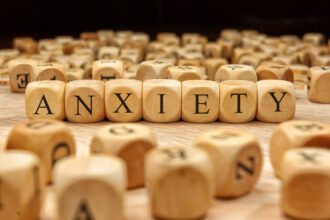In the US alone, over 30 percent of adults have an anxiety disorder at some time in their lives. And there’s a large proportion of people who are unaccounted for – people who think that their anxiety is part of their personality. Fortunately, more people have started seeking professional treatment for their anxiety disorders, including pharmacotherapy and psychotherapy.
But despite the effectiveness of evidence-based therapies, mental health experts also recommend focusing on what you eat. In fact, researchers have found links between our mental health and our diets. As a result, nutrition plays an important role in the treatment process for your anxiety disorder.
What is Anxiety?
The American Psychiatric Association describes anxiety as being in a state of anticipation of a future concern. Everyone experiences anxiety from time to time. It’s characterized by worried thoughts, feelings of tension, and physiological changes like an increase in blood pressure.
But when your anxiety is constant, it can have negative effects on your ability to function in occupational, social, and other settings – this is an anxiety disorder. It involves repeated episodes of intense anxiety when you feel excessive worry or fear.
How Nutrition Impacts Your Mental Health
Most disorders are linked to some form of chemical imbalance in the brain. And the food we eat plays a major role in how our brain functions. Micronutrients, which include vitamins and minerals, as well as omega-3 fatty acids and antioxidants, are essential for the healthy functioning of the brain.
But when you consume a diet that’s high in refined carbohydrates and sugar, it can result in excess glucose in the brain. This, in turn, is linked to cognitive and memory deficiencies. Sugar is also harmful to the brain because of its effects on neurotransmitter levels. Such an imbalance could potentially result in a mental disorder.
Inpatient Programs: Making Nutrition A Part of Treatment
Integrating nutrition as a part of the treatment process is a holistic approach toward recovery. In fact, it’s the model that many inpatient treatment programs are based on, such as United Recovery Mental Health Treatment.
Residential programs incorporate balanced nutrition by providing clients with freshly prepared meals. Holistic therapy is based on the principles of focusing on physical, mental, and spiritual well-being as a way to alleviate mental health problems.
It implies that you’re less likely to see the benefits of medication and psychotherapy if your body isn’t getting the nutrition it needs. Similarly, a diet full of necessary nutrients can make you more receptive to the effects of therapy. This makes nutrition part of a multifaceted approach.
Nutritional Deficiency
One study indicates that excessive consumption of fat and insufficient vitamin intake are core aspects of a nutritional imbalance. Combined, they contribute to the stress hormone dysregulation and inflammation.
Research shows a link between mental disorders and diets that are severely deficient in essential vitamins, minerals, and omega-3s. Mental health professionals have noted that when clients’ diets were supplemented with vital nutrients, their symptoms improved.
How Your Digestive Tract is Linked to Anxiety
When alleviating anxiety disorders, the first line of treatment usually involves prescribing an antidepressant such as SSRIs. These work by blocking the reuptake of serotonin, which is one of the most important neurotransmitters that regulates your mood and how you feel. Because about 95 percent of your serotonin is made in your gastrointestinal tract, the health of your digestive tract has an impact on your emotions.
Neuronal function and the production of neurotransmitters depend on your microbiome – the good bacteria in your digestive tract. However, high-fat diets are linked to inflammation, which can disable the gut microbiome and result in poor neurotransmitter function. This, in turn, increases the risk of developing an anxiety disorder.
Effects of a High-Fat Diet on GABA Levels
Gamma-aminobutyric acid, also known as GABA, prevents neurons from creating, sending, and receiving chemical messages from other neurons. Researchers consider it a crucial neurotransmitter for controlling anxiety.
Because GABA acts as a natural relaxant, lower levels are associated with a higher risk of anxiety disorders. And GABA levels are affected by what you eat, because studies show that high-fat diets can decrease GABA concentrations in the hippocampus and frontal cortex.
Some Foods Can Worsen Anxiety
When undergoing anxiety disorder treatment, there are certain foods you must avoid. And if you’re enrolled in a residential treatment program, it’s likely that you won’t find any of these foods on the menu.
High-Sugar Foods
Although sugar doesn’t directly affect your anxiety symptoms, it can certainly make them worse. Physiological symptoms of anxiety include shortness of breath, increased heart rate, and palpitations. Consuming foods with high sugar concentrations can result in a blood sugar crash. It’s accompanied by symptoms like irritability and anxiety.
Processed and Canned Foods
Processed foods such as cured meats and canned soup contain large amounts of salt. A high sodium intake is linked to an increase in stress hormone production. Considering how anxiety disorders are associated with higher salivary cortisol levels, consuming foods with high sodium concentrations can worsen anxiety symptoms.
Other foods to avoid are caffeine, refined carbohydrates, and artificial sweeteners.
Foods That Help Alleviate Anxiety
During anxiety disorder treatment, our healthcare provider will recommend increasing your intake of foods that are rich in omega-3 fatty acids, antioxidants, and micronutrients.
Salmon – Rich in Omega-3 Fatty Acids
Studies show that supplementation of omega-3 fatty acids helps in alleviating anxiety symptoms. Salmon and other fatty fish like mackerel, tuna, and sardines contain omega-3 fatty acids, which can improve your mood.
Yogurt – Contains Probiotics
As mentioned above, your gut health plays an important role in neuronal function and neurotransmitter production. Eating foods rich in probiotics, like yogurt and fermented food, can enhance your gut microbiome.
Chamomile and Green Tea – Anti-Inflammatory
Studies show that chamomile can lower inflammation and regulate levels of neurotransmitters in the brain. Meanwhile, green tea can help lower cortisol levels, which is linked to stress and anxiety.
Eggs – B Vitamins
Studies show that taking vitamin B complex supplements can ease anxiety and depression symptoms. Foods like eggs, leafy greens, and legumes are rich in B vitamins. Meanwhile, greens such as kale and spinach are a risk in magnesium.
In addition to these foods, studies show that supplements containing essential amino acids reduce symptoms of mental disorders such as anxiety and depression.
Conclusion
Nutrition plays an important role in anxiety disorder treatment and should be part of a comprehensive plan. Balanced nutrition is most effective when practiced alongside evidence-based therapies for anxiety disorders. Make sure to discuss a meal plan with a nutrition specialist to make sure you get the nutrients you need.










